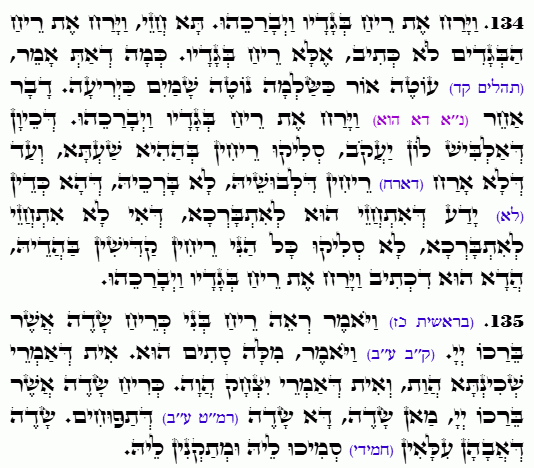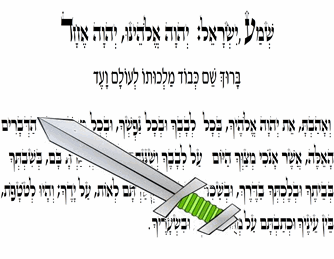Daily Zohar # 4716 – Toldot – Like the fragrance of a field
Daily Zohar 4716

Hebrew translation:
135. וַיֹּאמֶר רְאֵה רֵיחַ בְּנִי כְּרֵיחַ שָׂדֶה אֲשֶׁר בֵּרֲכוֹ ה’. וַיֹּאמֶר – דָּבָר נִסְתָּר הוּא. יֵשׁ אוֹמְרִים שֶׁהָיְתָה הַשְּׁכִינָה, וְיֵשׁ אוֹמְרִים שֶׁיִּצְחָק הָיָה. כְּרֵיחַ שָׂדֶה אֲשֶׁר בֵּרֲכוֹ ה’ – מִי הַשָּׂדֶה? זֶה שְׂדֵה הַתַּפּוּחִים, הַשָּׂדֶה שֶׁהָאָבוֹת הָעֶלְיוֹנִים [חוֹמְדִים] סוֹמְכִים אוֹתוֹ וּמְתַקְּנִים אוֹתוֹ.
.
Zohar Toldot
Continued from previous DZ
#134
“וַיָּרַח אֶת רֵיחַ בְּגָדָיו וַיְבָרֲכֵהוּ” “And he smelled the fragrance of his garments, and he blessed him” (Genesis 27:27). Come and see: It does not say “the fragrance of the garments,” but rather “the fragrance of his garments,” as it is written: “עֹטֶה אוֹר כַּשַּׂלְמָה נוֹטֶה שָׁמַיִם כַּיְרִיעָה” “Who covers Himself with light as with a garment; Who stretches out the heavens like a curtain” (Psalms 104:2).
This verse refers to Zeir Anpin, the middle line of the Tree of Life. Zeir Anpin limits the illumination of Chokmah so that it illuminates as a fragrance that ascends from below to above. Therefore, the verse says “the fragrance of his garments,” specifically, meaning after Jacob—representing the middle line—wore them. Before Jacob wore them, they emitted no fragrance.
Another explanation for ‘And he smelled the fragrance of his garments’: When Jacob wore the garments, they emitted a fragrance at that moment. As long as Isaac had not smelled the fragrance of the garments, he did not bless him. Only when they emitted their fragrance, did Isaac know that Jacob was worthy of blessing. These holy fragrances would not have risen with him if Jacob had not been worthy. This is the meaning of the verse: “And he smelled the fragrance of his garments, and he blessed him.”
#135
“וַיֹּאמֶר רְאֵה רֵיחַ בְּנִי'” “And he said, ‘See, the fragrance of my son…'” (Genesis 27:27). The phrase “And he said” is ambiguous, as it is not clear who is speaking. Some say that the Shechinah was the one speaking, while others say that Isaac was speaking.
“כְּרֵיחַ שָׂדֶה אֲשֶׁר בֵּרֲכוֹ ה” “Like the fragrance of a field which YHVH has blessed.” The text asks, “Which field is this?” and answers: “It is the field of apples,” referring to the Nukva, which is called “the field of holy apples” (“חקל תפוחין קדישין” in Aramaic). This is the field that the supernal fathers—Chessed, Gevurah, and Tiferet—correct and support.
Explanation: When the Nukva receives from Chessed, Gevurah, and Tiferet of Zeir Anpin, which are called the three colors of the apple—white, red, and green—she is then called “the field of apples.” At that time, she is illuminated with the light of Chokmah. Since the illumination of Chokma in her shines only from below to above, she is referred to as “fragrance” because the fragrance is received from below to above—from the nose to the brain—and does not flow from above to below.
Thus, the verse “like the fragrance of a field which YHVH has blessed” refers to the illumination of Chokma within the Nukva, which shines in the fragrance aspect.
Notes:
The white of the Apple represents Chessed, the Red for Gevurah, and the Green for Tiferet.
{||}

 Previous: Toldot
Previous: Toldot


